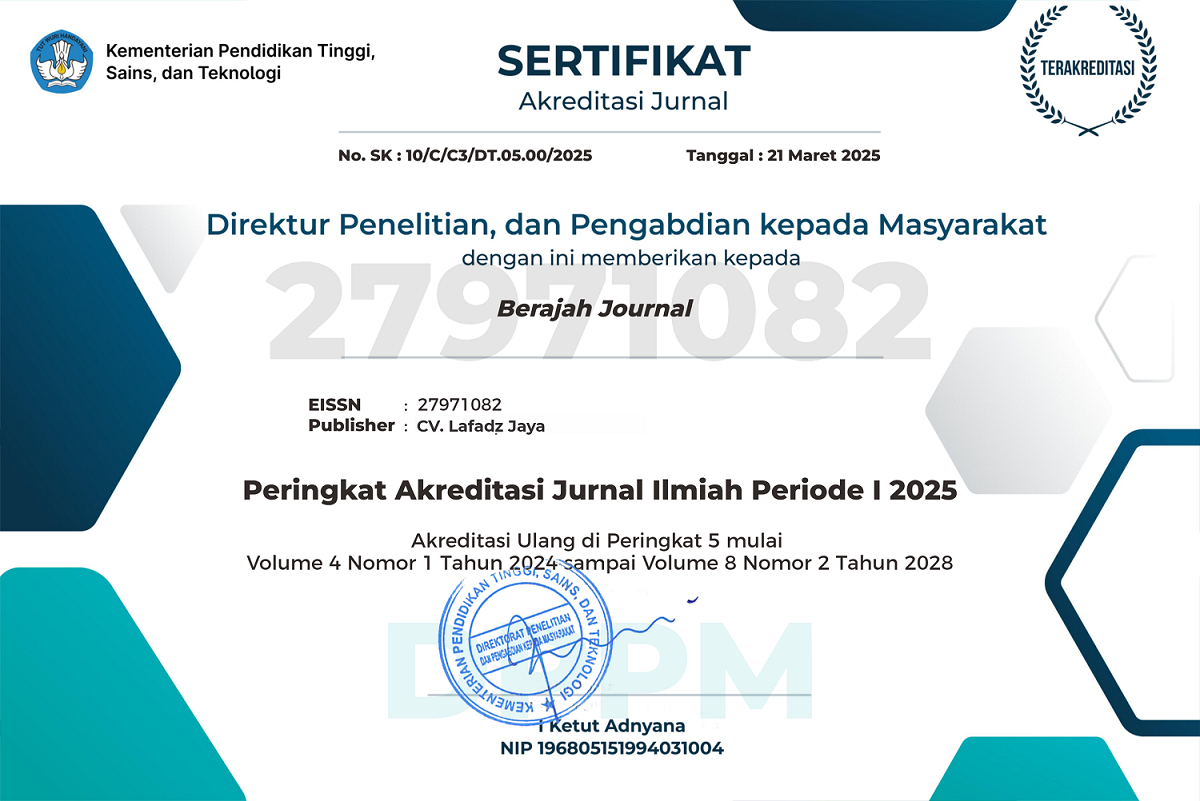INTEGRASI SISTEM PEMBAYARAN NON-TUNAI DALAM KERANGKA EKONOMI SYARIAH: ANALISIS KOMPATIBILITAS DAN IMPLIKASI
DOI:
https://doi.org/10.47353/bj.v4i7.435Keywords:
Islamic economics, cashless payment systems, Islamic fintech, maqasid shariah, financial innovationAbstract
This research examines the integration of cashless payment systems within the framework of Islamic economics, focusing on compatibility analysis and implications. Through a qualitative descriptive approach based on library research, this study investigates the alignment of digital payment technologies with Islamic financial principles. In-depth analysis of contemporary literature, Islamic scholarly opinions, and industry reports is conducted to identify potential synergies and challenges in the adoption of cashless payment systems by Islamic financial institutions. The findings reveal significant opportunities for innovation in Islamic fintech, while also highlighting the need for a comprehensive regulatory framework to ensure compliance with maqasid shariah. This research contributes to a deeper understanding of the dynamics between financial technological advancements and Islamic economic principles, providing a foundation for the development of innovative Islamic financial policies and products in the digital era.
Downloads
References
Alfarizi, Muhammad, Rastinia Kamila Hanum, and Syaibatul Aslamiyah Hidayat. 2021. “Optimizing the Use of Sharia Digital Transactions To Sup- Port Indonesia ’ S Economic Recovery.” 6(1):122–32. doi: 10.20473/jiet.v6.i1.25977.
Aulia, Mahdiah, Aulia Fitria Yustiardhi, and Reni Oktavia Permatasari. 2020. “An Overview of Indonesian Regulatory Framework on Islamic Financial Technology (Fintech).” Jurnal Ekonomi & Keuangan Islam 6(1):64–75. doi: 10.20885/jeki.vol6.iss1.art7.
Fasya, Gania. 2022. “Inovasi Produk Keuangan Dalam Hukum Ekonomi Syariah Tren Terkini Dan Masa Depan.” Jurnal Ekonomi Dan Bisnis 2(1):57–60.
Mahmod, Zulzaidi, and Ahmad Hidayat Buang. 2022. “Transformasi Teknologi Elektronik Melalui Aplikasi Sistem E-Syariah Dan i-Syariah Dalam Sistem Pengurusan Mahkamah Syariah Di Malaysia.” Kanun Jurnal Undang-Undang Malaysia 34(1):45–74.
Marhaen, Marhaen, and Jaenab Jaenab. 2021. “Pengaruh Teknologi Informasi Terhadap Pengembangan Potensi Dan Kinerja Pegawai Di BPMDES Kabupaten Bima.” Jesya (Jurnal Ekonomi & Ekonomi Syariah) 4(2):886–95.
Nurhayati, Neni. 2022. “Kinerja Sistem Informasi Akuntansi Yang Dipengaruhi Oleh Kemampuan Teknik Personal, Kecanggihan Teknologi Informasi Dan Kepuasan Pengguna.” Ekonomi, Keuangan, Investasi Dan Syariah (EKUITAS) 3(4):903–10.
Rodliyah, Nunung, Recca Ayu Hapsari, Aditya Mahatidanar Hidayat, Lukmanul Hakim, and Ade Oktariatas K. 2020. “Sharia Financial Technology in the Development of Bankable Micro Businesses.” International Journal of Financial Research 11(6):203. doi: 10.5430/ijfr.v11n6p203.
Winata, Muhammad Reza, and Oly Viana Agustine. 2019. “Rekoneksi Hukum Dan Disrupsi Teknologi Melalui Tafsir Konstitusional Mendukung Pembangunan Ekonomi Berkelanjutan.” Jurnal Legislasi Indonesia 16(4):458–76.
Yolanda, Vina, Riduan Mas’ud, and Shofia Mauizotun Hasanah. 2022. “PENGARUH TEKNOLOGI KEUANGAN DAN KUALITAS LAYANAN DIGITAL TERHADAP KEPUASAN NASABAH PADA BANK SYARIAH INDONESIA KCP MASBAGIK.” IQTISHADUNA 13(1):63–83.
Zuchroh, Imama. 2021. “Fintech Syariah: Kolaborasi Teknologi Dan Moral Sebagai Instrumen Pembiayaan Di Masa Depan.” Ecoplan 4(2):122–30. doi: 10.20527/ecoplan.v4i2.383.
Zuchroh, Imama. 2022. “Menyelami Keuangan Islam: Tradisi Dan Legacy.” Jurnal Ilmiah Ekonomi Islam 8(1):531. doi: 10.29040/jiei.v8i1.4348.
Downloads
Published
How to Cite
Issue
Section
License
Copyright (c) 2024 Imama Zuchroh

This work is licensed under a Creative Commons Attribution 4.0 International License.






















